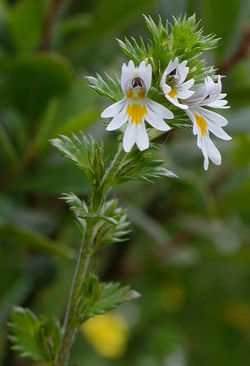Euphrasia
Other Names : Eyebright, Aufraise, Augentrostkraut, Casse-Lunettes, Eufrasia, Euphraise, Euphraise Officinale, Euphraise de Rostkov, Euphrasia, Euphraisia Eye Bright, Euphrasia officinalis, Euphrasia rostkoviana, Euphrasia stricta, Euphrasiae Herba, Eye Bright, Herbe d'Euphraise, Luminet.
See also : Euphrasia Officinalis (Homeopathy)
Special Precautions of Euphrasia
Eyebright herb in moderate doses doesn't have any known side effects when used internally. However, it is recommended to be very cautious when using it topically as an eyewash due to the possible unsterilized conditions during its preparation. It is advised to seek expert supervision when any kind of eye treatment is involved since any mishandling can cause severe infection. To avoid potential infection risks it is recommended to buy commercially prepared eyebright eyewash products available in the market. People who have had cataract removal, laser eye treatment, cornea transplantation, or any other eye surgery should not use Eyebright wash or drops unless advised by their health care provider. If you are taking any medication, or are pregnant or breastfeeding, consult with your physician before the therapeutic use of Eyebright herb. Some people may be allergic to the herb and the external use of Eyebright may cause swollen eyelids, itchiness, sensitivity to light, and eye pressure. Also, an overdose of Eyebright when taken internally may cause confusion, headache, nausea, and unusual perspiration. If you experience any of these symptoms during the consumption of Eyebright herb, contact your doctor immediately.
The benefits of Euphrasia are
Eyebright has been used for centuries in the treatment of a number of ailments. The nutritional and herbal ingredients make it beneficial for many eye problems including ophthalmia (severe inflammation of the eye), blepharitis (inflammation of the eyelids), conjunctivitis (pink eye), cataracts, stye, weeping eye, and bloodshot or strained eyes. It has also been found to be beneficial in treating respiratory conditions including bronchitis, colds, sinusitis, and allergies. Skin problems such as acne and stretch marks, as well as bad memory, have also been found to respond well to Eyebright treatments.
- Eye Problems : Eyebright is famous for its use in treating eye related problems, as well as slowing down progressive vision weakness due to age.
- Eye Inflammation : For ophthalmia, blepharitis, stye and any other eye inflammation, an Eyebright tea might be beneficial when used as a cold eye compress. To make Eyebright tea, take 1 teaspoon of carefully washed Eyebright herb and boil it in 1 1/2 cup of water for 10 minutes. Drain the leaves with a very fine strainer or cotton cloth and let it cool. Dip a small cotton pad in it and use it as a compress three to four times daily.
- Cataracts, Pink Eye, Bloodshot Eyes : For cataracts, weeping eye, pink eye (conjunctivitis), blood shot and strained eyes, an Eyebright tincture may help when used as an eyewash. To make an Eyebright eyewash, mix 5-8 drops of tincture in 2 cups of cool filtered water or boil 1 teaspoon of eyebright in 1 1/2 cup of water. Dilute the strained tea in a cup of cool rose water. Washing the affected eyes with this eyewash every 4 hours may alleviate the symptoms. Herbal experts recommend this topical use for short term only. Due to possible impurities in homemade non-pharmaceutical Eyebright tea preparations, it is recommended to be supervised by an herbal expert during the external application of Eyebright for eye treatment. Drinking Eyebright tea and taking Eyebright capsules or tablets may speed up the healing process.
- Colds, Sinusitis, and Seasonal Allergies : Due to its herbal compounds Eyebright is considered a great remedy for treating allergies and respiratory discomfort. The natural astringent-tannins in the herb may help reduce the mucus discharge during colds and flu by tightening the mucous membranes. Flavonoids and defensive compounds in Eyebright may also help in treating seasonal allergies, coughs, cold, chest congestion and stuffy nose. It is suggested to make Eyebright tea by steeping the Eyebright teabag for 5 minutes in a boiling cup of water. Drink it two to three times daily. When using dried leaves, add one teaspoon of Eyebright leaves to one cup of boiling water. Let it steep for 5 to 7 minutes and strain out the leaves. Add honey for sweetness if desired. Drinking lots of water or orange juice can be helpful.
- Acne and Skin Irritation : Natural astringent and antibacterial agents in Eyebright are known to be effective in tightening the porous oily skin and healing acne and irritated skin. Therefore, a simple remedy for acne is to apply Eyebright poultice, cold Eyebright tea or its tincture onto the affected skin. To make the Eyebright poultice, crush fresh Eyebright leaves and flower petals and apply it directly onto the acne areas every night. Remove the poultice after 20 minutes before going to bed and wash the face in the morning. If fresh leaves are not available a poultice can be made by soaking crushed dry leaves and petals into slightly warm water for ten minutes. To apply Eyebright tea or tincture, simply dab a cotton pad into cold steeped tea or in a mixture of 5 drops of tincture in 1/4 cup of cold water. Gently apply the soaked cotton pad onto affected areas. For a hassle free application, 5-6 drops of Eyebright oil can be mixed into the face moisturizer and can be applied overnight.
- Bad Memory : The flavanoids and beta-carotene in Eyebright herb may help improve cognitive performance and strengthen bad memory. A great home remedy can be made by mixing 2 tbsp powder of the dried Eyebright herb, 1 tsp sugar, half tsp of ground mace, 2 tbsp of fennel seeds together. Take half teaspoon of this mixture every morning with juice. Or simply drinking one cup of Eyebright tea daily may improve the gradual memory loss.
